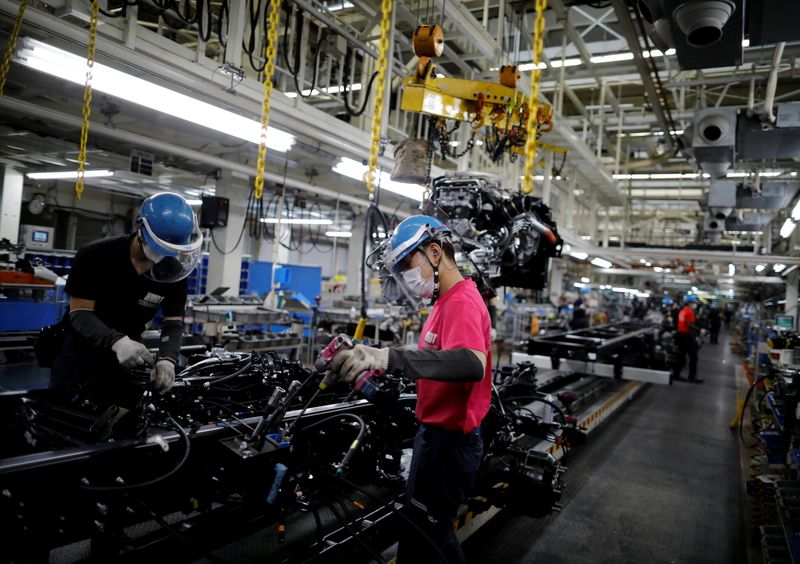By Daniel Leussink
TOKYO (Reuters) -Japan's industrial output shrank in July as car production took a hit from a coronavirus resurgence in Asia that has cast doubt over the recovery in the world's third-largest economy.
A spike in highly contagious Delta variant cases has forced governments in Asia to impose fresh lockdowns and curbs, which are causing disruptions in parts supply across the region, adding to a global chip shortage.
"There's a risk output will stall heading into the year-end," said Takeshi Minami, chief economist at Norinchukin Research Institute.
"Car production is likely to be a drag on output in August and September."
Factory output dropped 1.5% in July from the previous month, official data showed on Tuesday, hit by a decline in the production of autos, including passenger cars and small buses.
The fall offset growing output of production machinery items, such as those used for manufacturing semiconductors, and electronic parts and devices.
That meant output fell back below pre-coronavirus pandemic levels again after surging 6.5% in the prior month, though it was stronger than a 2.5% drop forecast in a Reuters poll of economists.
Manufacturers surveyed by the Ministry of Economy, Trade and Industry (METI) expected output to advance 3.4% in August and 1.0% in September.
Overall output was projected to get a boost from a sharp jump in production machinery manufacturing next month, even as that of transport equipment, which includes car production, was seen shrinking more than 7% from the previous month.
But the forecast for the decline in transport equipment was probably not fully factoring in parts supply disruptions in Southeast Asia, a government official said.
Toyota Motor (NYSE:TM) Corp, the world's largest automaker by sales volume, said this month it would cut September production by 40% from its previous plan due to the chip crunch.
Manufacturers' finely tuned supply chains mean carmakers often optimise car parts supplies, increasing the risk of output delays once inventories run out and replacement parts fail to turn up, said Minami.
Separate data on Tuesday showed the jobless rate edged down for the second straight month, dropping to 2.8% from 2.9% in June, with the actual number of those unemployed posting the first year-on-year fall in 18 months.
An index gauging job availability gained slightly to 1.15 from 1.13 in June, labour ministry data showed.
A separate government survey showed consumer confidence worsened in August, falling to a three-month low, as wider curbs in response to rising numbers of COVID-19 cases weighed on people's willingness to spend.

Japan's economy expanded an annualised 1.3% in the second quarter, driven by solid consumption and exports.
But growth is expected to remain modest in the current quarter, with some analysts forecasting a possible contraction, as the country struggles with a COVID-19 resurgence, which has burdened medical facilities and shows no signs of abating.